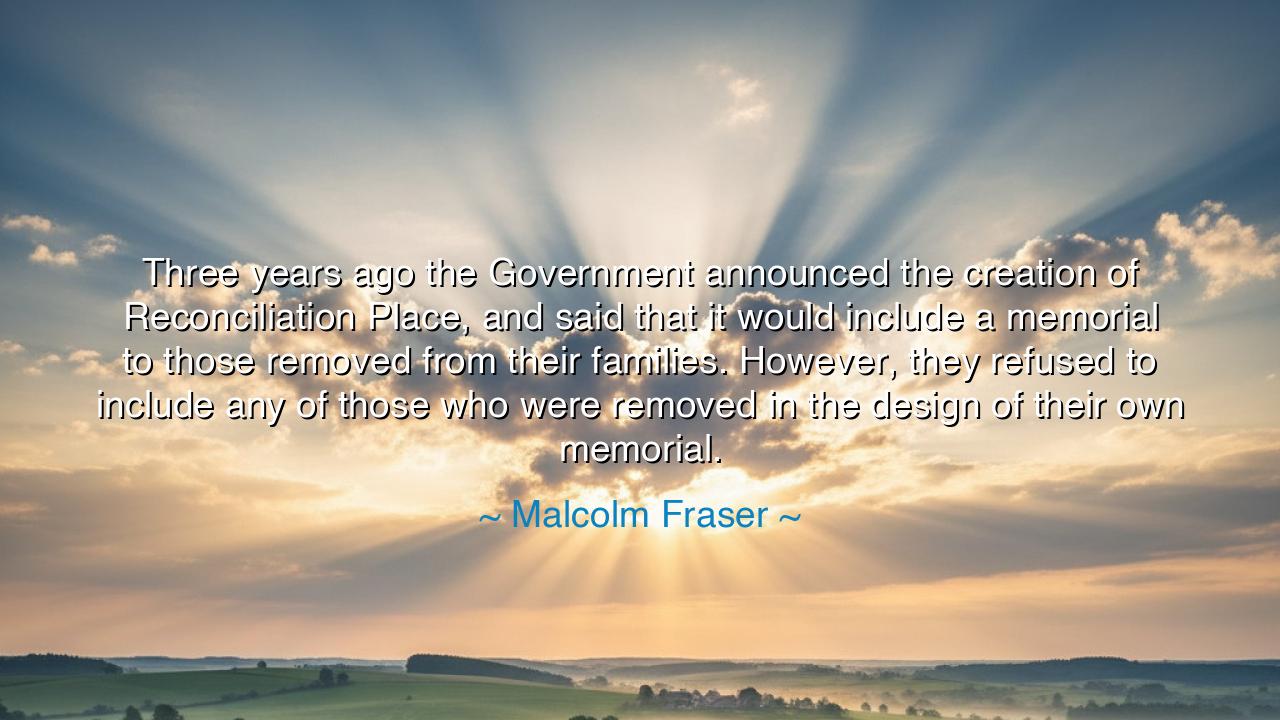
Three years ago the Government announced the creation of
Three years ago the Government announced the creation of Reconciliation Place, and said that it would include a memorial to those removed from their families. However, they refused to include any of those who were removed in the design of their own memorial.






When Malcolm Fraser declared, “Three years ago the Government announced the creation of Reconciliation Place, and said that it would include a memorial to those removed from their families. However, they refused to include any of those who were removed in the design of their own memorial,” he spoke with the sorrow and clarity of a man attuned to the justice denied and the voices unheard. His words remind us that memory, when shaped without the consent or participation of those most affected, risks distortion, erasure, and dishonor. A memorial is not merely stone or inscription; it is a vessel of truth, empathy, and acknowledgment, and those whose lives it commemorates must be allowed to guide its form.
The origin of this quote lies in Fraser’s reflections on the treatment of Australia’s First Peoples, particularly the children of the Stolen Generations, who were forcibly removed from their families as part of government policies. The announcement of Reconciliation Place was intended to acknowledge this grievous chapter in history, yet Fraser observed a profound injustice: the absence of the voices of those who suffered in the creation of their own memorial. His statement underscores that reconciliation and commemoration are hollow if they exclude the very people whose experiences demand remembrance.
Fraser’s insight echoes the wisdom of the ancients, who understood that history is both recorded and lived. The Greeks and Romans knew that monuments were more than stone; they were acts of memory and moral instruction. To build a memorial without consulting those who lived the events is akin to silencing the chorus in a tragedy — the heart of the story is lost, and the audience receives only the perspective of the powerful. Fraser warns that true recognition and justice in memory requires inclusion, respect, and attentiveness to those most affected.
Consider the story of Yad Vashem, the Holocaust memorial in Jerusalem. Its creation involved extensive consultation with survivors, historians, and families of victims. Their experiences shaped the narratives, the spaces, and the symbols, ensuring that the memorial reflected authenticity, dignity, and the voices of those who endured the atrocities. This stands in contrast to the situation Fraser describes: a memorial designed without participation of the affected, a structure of remembrance that risks becoming a monument to authority rather than to lived experience.
The deeper meaning of Fraser’s words is a moral one: commemoration is not an act of convenience or public relations, but an ethical obligation. A memorial must embody truth, empathy, and the lived reality of those it honors. By excluding those removed from their families from the design, the government undermines the very purpose of remembrance, reducing a profound human suffering into a distant, aestheticized symbol. Fraser reminds us that recognition is not complete unless those who endured the pain are allowed to shape its remembrance.
Fraser also highlights a timeless principle: the oppressed must be agents in the telling of their own stories. History told by outsiders, however well-meaning, risks flattening complexity, omitting nuance, and perpetuating the very injustices it seeks to acknowledge. Across time, from the recording of the lives of slaves to the chronicles of indigenous peoples, those who are excluded from the narrative lose more than voice — they lose agency, dignity, and the power to shape collective memory.
O listener, take this teaching to heart: when honoring suffering, when remembering injustice, include those who experienced it. Seek their counsel, listen to their stories, and allow their perspectives to guide commemoration. A memorial is not a gift from the powerful; it is a reflection of truth, empathy, and acknowledgment, constructed to resonate with those who carry the weight of history.
In the end, Malcolm Fraser teaches that justice in memory requires inclusion. Stone and inscription alone cannot heal; only the voices of the remembered, heard and honored, can transform grief into reflection, pain into recognition, and exclusion into reconciliation. To commemorate rightly is to recognize the humanity, experience, and authority of those most affected — for in their guidance lies the path to truth, dignity, and enduring moral remembrance.






AAdministratorAdministrator
Welcome, honored guests. Please leave a comment, we will respond soon